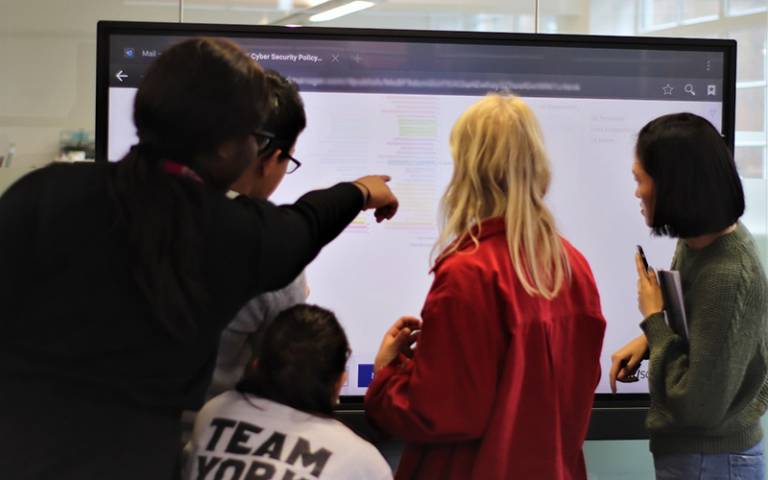New project examines role of interactive displays in university learning
12 November 2019
UCL Science, Technology, Engineering and Public Policy (STEaPP) and the BenQ Corporation have launched a joint research project to test how interactive displays can be used to enhance teaching and student learning experiences.

Led by Dr Alex Chung and Alan Seatwo, the collaboration will use STEaPP’s flagship Master’s of Public Administration (MPA) programme as a case study for the use of the technologies in a learning environment. The project will culminate in the publication of a handbook on how interactive displays can be used to actively encourage student participation in the classroom and lead to a more effective learning experience.
Alan Seatwo, Senior Teaching Fellow in UCL STEaPP, said: “Universities are constantly adapting their teaching approaches to make student’s learning experiences more personal. At the same time, they need to ensure that their graduates have a high level of subject expertise to positively impact society.
“The UK has the highest concentration of interactive displays in classroom’s in Europe, with almost all classrooms in UK universities having such devices. Most of these displays include educational software but not all teachers are aware of how to best use these features or the positive impact they can have on student learning.”

The interactive displays, which were provided to STEaPP by the BenQ Corporation for the pilot study, have been specially designed and programmed to foster a collaborative learning environment. For example, each machine includes the cloud-based EZWrite whiteboard software which allows teachers to access their files in any classroom and for teachers and students to share notes by annotating on the same virtual board.
The research project will include three pilot exercises by STEaPP, the first of which was carried out earlier this month during a teaching session for the MPA in Digital Technologies and Public Policy. During the session, Dr Alex Chung presented an interactive map developed by the STEaPP Digital Technologies Policy Lab, which is led by Professor Madeline Carr, that demonstrates where cybersecurity policy is developed in the UK and the complexity of the current policy landscape.
Dr Alex Chung said: “We used this particular mapping project for the pilot study as it very aptly represents a ‘wicked policy problem', a term political scientists use to refer to complex, open-ended and intractable policy issues that are hard to manage. The interdependencies with other public policy domains makes it difficult to fully understand or define the nature of these problems and the potential solutions to them. It is also extremely challenging to present these types of policy issues using immersive features, such as the map, in a way that is engaging for the audience and doesn’t involve focusing entirely on a laptop screen.”
The feedback collected from both students and users of the interactive displays will form the basis of the Handbook produced by the research team. The Handbook, in addition to featuring case studies from UCL and Oxford University on the use of interactive display in a classroom setting, will cover more broadly the topics of the 21st century skills gap, blended learning and project-based learning.
The Handbook is due to be published in February 2020.
 Close
Close

